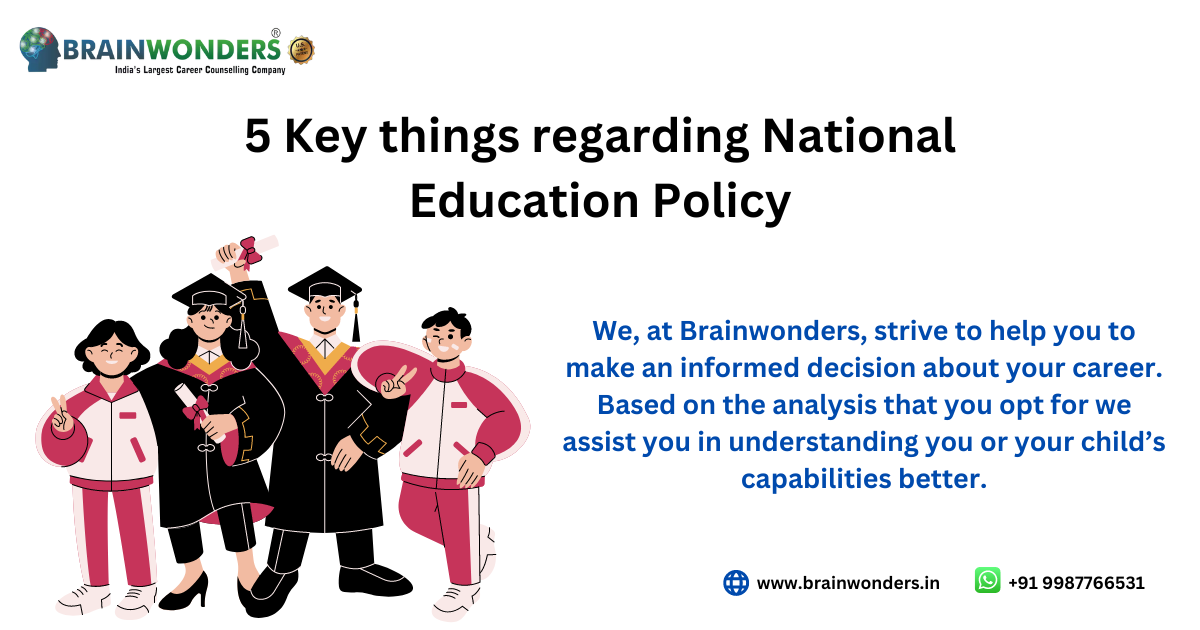

Let the best team of psychologists and career counsellors help you achieve your dream career!
Get expert guidance about your abilities, industries, and best ranked career options for you
Blog
09 May,2023 | By Brainwonders

2020 is a year of crisis! We all have witnessed the pandemic which bought the world to a standstill. This pandemic bought numerous changes of which Work From Home (WFH) and online schooling were the most remarkable ones. The idea of ‘everything digital’ just got real! While adults could easily adapt to the WFH idea, the children had a tough time handling this change. It was majorly the responsibility of the teaching structure to help kids adopt a new side of learning. In short, to create a classroom kind of environment at home.
With all such challenges in 2020, came the New Education Policy (NEP). It was last framed in 1986 and launched on 29th July 2020. The idea was put forward by former ISRO Chief K. Kasturirangan who discussed the ongoing issue and transitions in the education system. He aimed to create an impact on everyone ranging from primary school to the workplace. It was approved by the union cabinet and has successfully made revolutionary reforms in the Indian education paradigm. Are you wondering what this New Education Policy can get? Let’s read out to find more.
This policy introduces you to a single regulator for higher education institutions, the scheme of multiple entries and exit options in degree courses, the low stakes board exams, and common entrance exams for universities.
Recommended Read:

This revised policy expands the age group for mandatory schooling from 6-14 years to 3-18 years. This new system will provide you with 12 years of schooling with three years of Aanganwadi/ pre-schooling.
Visit: Brainwonders - Largest DMIT & Career Counselling Company in India
The National education policy 2020 has directed its focus on your mother tongue as the medium of instruction. The ‘three language formula’ mandates no language would be imposed on you. This policy indicates that you can now be able to study in your mother tongue/ local language and/or your regional language till at least grade five and beyond. This will ensure that you will be able to understand the subject and not merely read without understanding the meaning of it
The Higher Education Commission of India (HECI) will now set up a regulatory body for the entire higher education. Norms, regulations, accreditation, and academic standards will be the same for both the private and public sectors. Thus, providing you with the opportunity to give one common entrance exam for higher education, multiple exit and entry wherein you can start and end your education allowing you to join back without losing your credits.
As per NEP 2020, the rigid separations between subjects’ streams will be done away with. You can now have the liberty to choose subjects you would like to study across streams. Vocational education will also be introduced to you from Class 6 and will include internships as well with local trades and crafts. Additionally, coding will also be taught to you beginning from Class 6.
Visit: Online Career Counselling & Career Guidance | Best Career Counsellors – Brainwonders
The duration of the undergraduate degree will be either 3 or 4 years. Students will also be given multiple exit options within this period. Colleges will have to grant a certificate to a student if they would like to leave after completing 1 year in a discipline or field including vocational and professional areas, a diploma after 2 years of study, or a Bachelor’s degree after completing a three-year programme. An Academic Bank of Credit will be established by the Government for digitally storing academic credits earned from different Higher Educational Institutions so that these can be transferred and counted towards the final degree earned.
Visit: Online Aptitude Test: How to take Career Aptitude Test? – Brainwonders
Let the best team of psychologists and career counsellors help you achieve your dream career!